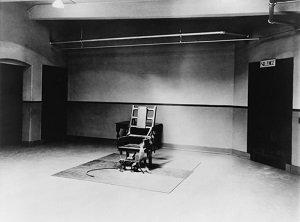Recent Blog Posts
Examples of Money Laundering in Connecticut
 The idea of money laundering can seem like a very complex crime left mostly to the mafia or executives of high-powered companies. It does not seem like a crime that would be one commonly perpetrated by everyday people or workers. In fact, money laundering encompasses several different types of financial crimes, which are often committed by everyday citizens. The Internal Revenue Service (IRS) is responsible for investigating allegations of money laundering, though cases are prosecuted in the judicial district in which the defendant was accused of the crime.
The idea of money laundering can seem like a very complex crime left mostly to the mafia or executives of high-powered companies. It does not seem like a crime that would be one commonly perpetrated by everyday people or workers. In fact, money laundering encompasses several different types of financial crimes, which are often committed by everyday citizens. The Internal Revenue Service (IRS) is responsible for investigating allegations of money laundering, though cases are prosecuted in the judicial district in which the defendant was accused of the crime.
Hidden Revenue Streams
The obvious type of money laundering is when large organizations, usually criminal in nature, hide profits from unsavory businesses, such as the drug trade, prostitution, or the black market for stolen goods. This money is often hidden in offshore accounts or in assets such as expensive cars and property.
Vehicular Manslaughter Charges in Connecticut
 Determining the most common causes of death in the world is a challenge, one that varies wildly depending on the reporting agency, year, and country. Yet vehicular manslaughter is one that consistently makes the lists year after year, even as other major health crises are addressed and subverted.
Determining the most common causes of death in the world is a challenge, one that varies wildly depending on the reporting agency, year, and country. Yet vehicular manslaughter is one that consistently makes the lists year after year, even as other major health crises are addressed and subverted.
Vehicular manslaughter is defined as the unintentional murder of someone while behind the wheel of a car, usually caused by reckless driving or gross negligence. Driving over the speed limit may be considered gross negligence, and thus the vehicular manslaughter charge could be treated as a misdemeanor. Conversely, if the person behind the wheel was drunk at the time of accident in which someone was killed, the charge will likely be a felony because the circumstance in which the person was driving was illegal from the beginning.
In Connecticut, a vehicular manslaughter conviction automatically carries a one-year license suspension and a two-year period in which the person must use an ignition interlock device in his or her car. A large percentage of vehicular manslaughter cases are the result of drunk driving. In Connecticut, this is considered second degree manslaughter, and carries the punishment of a Class C felony, punishable by one to ten years in prison and/or up to a $10,000 fine. Between 2001 and 2010, there were 191 second degree manslaughter convictions of this nature in the state.
Understanding the Legal Implications of Shoplifting in Connecticut
 Some people steal merchandise from a store because they are unable to afford the item they want or need. Others do so for the thrill, excitement, or adrenaline rush. And then there are those that shoplift for the sake of committing another crime, such as selling the goods in exchange for cash. Whatever the reason behind the act, shoplifting (otherwise known as larceny) is a crime with potentially far-reaching implications for those convicted.
Some people steal merchandise from a store because they are unable to afford the item they want or need. Others do so for the thrill, excitement, or adrenaline rush. And then there are those that shoplift for the sake of committing another crime, such as selling the goods in exchange for cash. Whatever the reason behind the act, shoplifting (otherwise known as larceny) is a crime with potentially far-reaching implications for those convicted.
Shoplifting Defined
Although shoplifting might seem like a pretty straightforward charge, it actually covers a large array of potential acts, including:
- Removal of goods from a merchant's establishment,
- Concealing goods with the intent to remove from a merchant establishment,
- Altering or removing labels or price tags of goods at a merchant establishment,
Police-Related Racial Disparities Still Exist in Connecticut
 Although efforts have been made to decrease the police-related racial disparities, new information indicates they are still present. In fact, according to the Associated Press, preliminary data indicates that officers fired stun guns at blacks and Hispanics suspects at a rate higher than white suspects last year. Officers are warning citizens not to be overly alarmed at the information because differences between departments and cities can make it difficult to compare percentages, but experts say they are still concerned.
Although efforts have been made to decrease the police-related racial disparities, new information indicates they are still present. In fact, according to the Associated Press, preliminary data indicates that officers fired stun guns at blacks and Hispanics suspects at a rate higher than white suspects last year. Officers are warning citizens not to be overly alarmed at the information because differences between departments and cities can make it difficult to compare percentages, but experts say they are still concerned.
Stun Gun Risks
For the most part, stun guns cause only minor injuries, including the need for removal of the prongs that deliver the shock. However, Amnesty International reports that at least 540 people in the United States have died after being shocked by a stun gun between the years 2001 and 2012. In Connecticut, 17 people have died since 2005, and 12 of them were minorities, the American Civil Liberties Union of Connecticut now says. So, while this is, overall, a very small percentage, the information does indicate a very real risk of stun gun death, particularly among minorities.
Hate Crimes Against People with Disabilities
 Hate crimes are largely considered those perpetrated against certain groups or individuals, motivated by the victim's religion, race, or sexual orientation. Indeed, the most widely-publicized incidents labeled as hate crimes are those in which a person is distinctly vocal about his or her disdain for a certain group of people and its beliefs, creeds, or private activities. Yet hate crimes can also be perpetrated against groups of people with disabilities, whether they are primarily physical. mental, or emotional in nature. In fact, studies show that people with learning disabilities are more vulnerable than others to experience bullying, harassment or to be victims of hate crime. In 2007, for example, 79 of the total hate crimes reported nationwide were committed against people with disabilities, a marked increase from the 44 hate crimes against people with disabilities that were reported in 2003.
Hate crimes are largely considered those perpetrated against certain groups or individuals, motivated by the victim's religion, race, or sexual orientation. Indeed, the most widely-publicized incidents labeled as hate crimes are those in which a person is distinctly vocal about his or her disdain for a certain group of people and its beliefs, creeds, or private activities. Yet hate crimes can also be perpetrated against groups of people with disabilities, whether they are primarily physical. mental, or emotional in nature. In fact, studies show that people with learning disabilities are more vulnerable than others to experience bullying, harassment or to be victims of hate crime. In 2007, for example, 79 of the total hate crimes reported nationwide were committed against people with disabilities, a marked increase from the 44 hate crimes against people with disabilities that were reported in 2003.
End of Year Study Finds Use of Death Penalty on the Decline, Less Popular Among Citizens
 Older than America itself (significantly older, really), the death penalty has always been largely supported by U.S. citizens. However, there is evidence that suggests that the tides may be shifting. In fact, if recent changes to state laws and a poll conducted by Gallup and the Pew Research Center are any indication, capital punishment may eventually become a thing of the past.
Older than America itself (significantly older, really), the death penalty has always been largely supported by U.S. citizens. However, there is evidence that suggests that the tides may be shifting. In fact, if recent changes to state laws and a poll conducted by Gallup and the Pew Research Center are any indication, capital punishment may eventually become a thing of the past.
Support for the Death Penalty at Nearly a 40-Year Low
Support for the death penalty in the United States reached its peak in the 1980s and ‘90s. It now sits somewhere between 56 and 61 percent, according to the 2015 study. While still considered to be the majority, this number marks a steady and continuous decline since the peak period. And, according to the Washington-based Death Penalty Information Center, this number also places support for the death penalty at nearly a 40-year low.
Raising Juvenile Justice System's Age of Eligibility Could Improve Rehabilitation
 It is illegal to purchase alcohol or handgun until the age of 21. Congressional seats are unobtainable until the age of 25, as are most discounts on car insurance. Even rental cars have added restrictions for those under the age of 25. And yet, all throughout the country, children as young as 14 are tried and convicted as adults. Even in Connecticut, where the age of eligibility is quite progressive, most young adults are pushed out of the juvenile system the moment they turn 18.
It is illegal to purchase alcohol or handgun until the age of 21. Congressional seats are unobtainable until the age of 25, as are most discounts on car insurance. Even rental cars have added restrictions for those under the age of 25. And yet, all throughout the country, children as young as 14 are tried and convicted as adults. Even in Connecticut, where the age of eligibility is quite progressive, most young adults are pushed out of the juvenile system the moment they turn 18.
Seems a little contradictory, does it not?
Interestingly enough, there are lawmakers and legislatures that actually agree; Governor Dannel Malloy is one of them. In fact, he recently proposed that Connecticut divert its youth from the adult correctional facility by raising its age of eligibility to 20, and that the state come up with alternative methods for handing non-violent offenders under the age of 25. As it turns out, there may be a number of benefits in doing so.
Bar Fights as Violent Assault
 The idea that alcohol and violent assault are linked is nothing new. In fact, sometimes alcohol is blamed for incidents of assault in which it was not present, or did not play a contributing role. This is sometimes the case, for example, in the event of domestic violence: Assault is blamed on the effects of alcohol, rather than a deep-seated issue within the partner him or herself. In fact, there are several studies that call alcohol the most common “date rape drug,” because while a person may decide to drink, if she consumes more than was planning or more than she can handle, the chance of unwanted sexual assault or contact can increase. Yet the rate of assault of a non-sexual nature seems to be linked to alcohol as well. This is due in part to the commonly-known side effect of alcohol to make a person more violent and less able to control his or her emotions.
The idea that alcohol and violent assault are linked is nothing new. In fact, sometimes alcohol is blamed for incidents of assault in which it was not present, or did not play a contributing role. This is sometimes the case, for example, in the event of domestic violence: Assault is blamed on the effects of alcohol, rather than a deep-seated issue within the partner him or herself. In fact, there are several studies that call alcohol the most common “date rape drug,” because while a person may decide to drink, if she consumes more than was planning or more than she can handle, the chance of unwanted sexual assault or contact can increase. Yet the rate of assault of a non-sexual nature seems to be linked to alcohol as well. This is due in part to the commonly-known side effect of alcohol to make a person more violent and less able to control his or her emotions.
A large number of convicted offenders admit to having been under the influence of alcohol when he or she committed the crime. Out of more than 5 million convicted offenders who were recently surveyed, nearly 2 million (more than 35 percent) report having been drinking or drunk when the crime was committed. An example of this is the common bar fight. While bar fights may have been romanticized throughout history (think Old West saloons), assaulting someone at a bar while drinking can have very serious consequences that may go on a person’s permanent record.
Connecticut Police Officers Increase Efforts to Catch DUI Drivers
 The holiday season is a busy time, with families getting together, going out to dinner after a long day of shopping, and spending time with friends at the local pub, restaurant, or bar. Police officers are busier, too, stopping drivers they believe may be intoxicated. In fact, it appears they are putting some extra manpower into catching more DUI drivers this holiday season.
The holiday season is a busy time, with families getting together, going out to dinner after a long day of shopping, and spending time with friends at the local pub, restaurant, or bar. Police officers are busier, too, stopping drivers they believe may be intoxicated. In fact, it appears they are putting some extra manpower into catching more DUI drivers this holiday season.
Thanksgiving Marked Beginning of Efforts
For officers, the arrests begin Thanksgiving Day and continue on through the New Year; this year was no exception. According to a press release from the State Police, they made nine DUI arrests, as well as another 393 for speeding on the very first day of the effort. They also issued 56 tickets for seatbelt violations and another 894 tickets for moving violations that included unsafe lane changes, following too closely, using cell phone while driving, texting, and failure to signal.
Hate Crimes and Intimidation
 The incidents of several different types of crime rises during the holiday season, likely due to increased stress levels, demands for money, and pervasive societal stress and expectations. Sadly, hate crimes are no exception to these trends. The rate of hate crimes spikes during the holidays both likely due to the aforementioned social quandaries, but also because of the holidays themselves—hate crimes against the Jewish community especially seem to spike during the holiday season, and this even more-so on the East Coast, where cities are comprised of large percentages of citizens who identify with the Jewish faith. In 2015, as terrorist attacks continue to infiltrate the fabric of everyday Western life, the rate of hate crimes against Muslims will likely keep pace as well.
The incidents of several different types of crime rises during the holiday season, likely due to increased stress levels, demands for money, and pervasive societal stress and expectations. Sadly, hate crimes are no exception to these trends. The rate of hate crimes spikes during the holidays both likely due to the aforementioned social quandaries, but also because of the holidays themselves—hate crimes against the Jewish community especially seem to spike during the holiday season, and this even more-so on the East Coast, where cities are comprised of large percentages of citizens who identify with the Jewish faith. In 2015, as terrorist attacks continue to infiltrate the fabric of everyday Western life, the rate of hate crimes against Muslims will likely keep pace as well.
More Than Faith-Based
Regardless, the highest rate of hate crime incident continues to be racially-motivated, at 47 percent nationwide. Hate crimes motivated by religious identification or sexual orientation are tied at second, each accounting for nearly 19 percent of all reported incidents of hate crimes. In Connecticut, a hate crime does not have to be defined as an act of physical violence or physical action. A hate crime can also be defined as a crime of intimidation, which includes criminal harassment or being threatened. A person can be charged with criminal harassment if the alleged victim can prove that he or she was being repeatedly followed, that the person repeatedly called the person’s place of work or home (either directly or through contacting a mutual acquaintance), or if a person receives threatening letters or emails.







